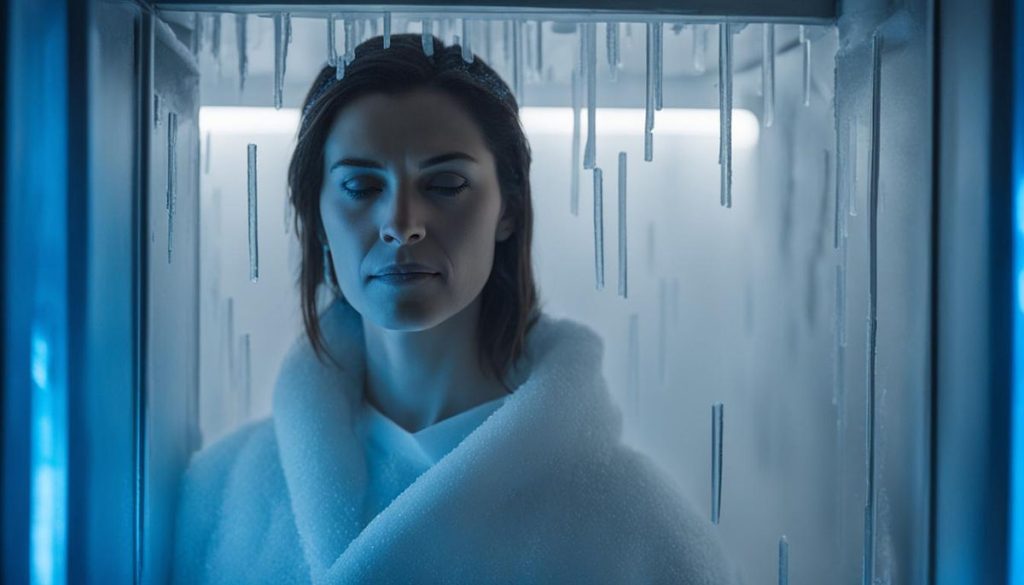Is Cryotherapy Good For Lupus?
 November 12, 2023 | Lupus
November 12, 2023 | Lupus
Lupus is a chronic autoimmune disease that causes inflammation and a variety of symptoms throughout the body. Traditional treatments for Lupus include anti-inflammatory medications and chemotherapy to suppress the immune system. However, many individuals are exploring natural remedies for lupus, such as cryotherapy, which has shown potential in reducing inflammation and improving symptoms.

Key Takeaways:
- Cryotherapy is being researched as a natural remedy for Lupus, offering potential relief from inflammation and symptoms.
- Lupus patients often seek holistic treatment options to complement conventional medications.
- Finding a reputable cryotherapy facility with experience in autoimmune diseases is crucial when considering cryotherapy for Lupus treatment.
- Personal testimonials highlight the positive experiences and the potential benefits of cryotherapy for Lupus patients.
- Ongoing research and clinical trials are being conducted to further explore the effectiveness of cryotherapy in managing Lupus symptoms.
The Link Between Lupus and Inflammation
Lupus is a complex autoimmune disease that causes chronic inflammation throughout the body. This inflammation not only leads to pain, stiffness, and mobility issues but also puts individuals at risk for organ damage and mental health problems. Managing inflammation is a key aspect of lupus pain management, and cryotherapy has emerged as a potential solution.
Cryotherapy involves exposing the body to extremely cold temperatures, which triggers physiological responses that can help reduce inflammation. Studies have shown that cryotherapy has anti-inflammatory effects, making it a promising treatment option for autoimmune diseases like lupus. By reducing inflammation, cryotherapy can provide much-needed relief for lupus sufferers, improving their overall quality of life.
One of the benefits of cryotherapy for lupus is its ability to target inflammation at the cellular level. By suppressing inflammatory pathways, cryotherapy helps mitigate the symptoms that lupus patients experience. This natural approach to inflammation management offers an alternative to traditional treatments like anti-inflammatory medications or chemotherapy. Cryotherapy has minimal side effects compared to these conventional treatments, making it an appealing option for those seeking holistic and natural remedies for their condition.
The Role of Cryotherapy in Autoimmune Diseases
Not only does cryotherapy offer benefits for lupus patients, but it also shows potential in managing autoimmune diseases as a whole. Cryotherapy’s ability to reduce inflammation and modulate the immune system can help alleviate symptoms in individuals with various autoimmune conditions. As research on cryotherapy continues to unfold, it may become an integral part of autoimmune disease management, providing patients with an effective and natural approach to pain relief and inflammation control.
| Treatment | Benefits |
| Cryotherapy | - Reduces inflammation – Provides pain relief – Minimizes side effects – Improves overall quality of life |
| Traditional medications | - Anti-inflammatory effects – Immune system suppression – Potential side effects and long-term risks |
While cryotherapy shows promise in managing lupus and other autoimmune diseases, it’s important to consult with medical professionals and find a reputable cryotherapy facility. Certified technicians can ensure the therapy is administered safely and effectively, minimizing the risk of side effects.
Participating in research studies or specialized cryotherapy treatment programs designed for lupus patients can provide tailored care and the most optimal results.
Cryotherapy’s Effects on Mental Health
Lupus patients not only battle physical symptoms but also grapple with mental health issues such as depression and anxiety. Fortunately, cryotherapy has emerged as a potential ally in alleviating these mental health symptoms and providing much-needed relief.
Research has shown that cryotherapy has a positive impact on mental health by targeting inflammation in the brain. The extreme cold temperatures used during cryotherapy sessions help reduce inflammation, which can contribute to improved mental well-being.
This natural treatment also helps balance neurotransmitters in the brain, which play a crucial role in regulating mood and emotions. By promoting the release of endorphins, cryotherapy can uplift mood, reduce anxiety, and promote better sleep patterns among Lupus patients.
By providing relief from mental health symptoms, cryotherapy offers a holistic approach to Lupus management, addressing both the physical and emotional challenges faced by patients.
Table: Benefits of Cryotherapy for Mental Health in Lupus Patients
| Benefit | Description |
| Reduces inflammation in the brain | Cryotherapy’s extreme cold temperatures help decrease inflammation, which can contribute to improved mental well-being. |
| Balances neurotransmitters | Cryotherapy promotes the balance of neurotransmitters in the brain, leading to improved mood and emotions. |
| Releases endorphins | Endorphins released during cryotherapy sessions can elevate mood, reduce anxiety, and promote better sleep patterns. |
While cryotherapy can offer significant relief for Lupus patients struggling with mental health symptoms, it is important to consult with healthcare professionals before incorporating it into a comprehensive treatment plan. A certified cryotherapy facility can provide the necessary expertise to ensure safety and maximize the benefits of this natural remedy.
How Cryotherapy Works for Lupus
Cryotherapy is a treatment that involves the brief application of very cold temperatures to the skin. This cold exposure triggers various physiological responses in the body, leading to a range of therapeutic benefits. In the case of Lupus, cryotherapy works by effectively suppressing inflammation at the cellular level throughout the body.
When the body is exposed to extreme cold, blood vessels constrict, reducing blood flow to the area. This vasoconstriction helps to reduce inflammation by limiting the release of pro-inflammatory molecules and immune cells. Additionally, cryotherapy stimulates the production of anti-inflammatory cytokines, further contributing to the reduction of inflammation.
Cryotherapy has been found to improve cardiovascular and pulmonary function, regulate hormone levels, and release endorphins, which can help with pain management and overall well-being for Lupus patients. It is important to note that cryotherapy should be conducted by certified technicians to ensure safety and minimize the risk of side effects.
Table: Potential Benefits of Cryotherapy for Lupus
| Benefit | Description |
| Reduced Inflammation | Cryotherapy suppresses inflammation at the cellular level, providing relief for Lupus symptoms. |
| Pain Relief | Cryotherapy triggers the release of endorphins, which can help manage pain associated with Lupus. |
| Improved Cardiovascular and Pulmonary Function | Cryotherapy stimulates blood circulation and enhances oxygen delivery, benefiting cardiovascular and pulmonary health for Lupus patients. |
| Hormone Regulation | Cryotherapy helps regulate hormone levels, which can have a positive impact on various bodily functions affected by Lupus. |
| Enhanced Well-being | The release of endorphins during cryotherapy can improve mood, sleep patterns, and overall quality of life for Lupus patients. |
Cryotherapy offers a non-invasive and natural treatment option for Lupus patients. By reducing inflammation, providing pain relief, and improving various aspects of physical and mental well-being, cryotherapy can play a valuable role in a comprehensive treatment plan for individuals living with Lupus.

Finding a Cryotherapy Treatment Program for Lupus
If you’re considering cryotherapy as a treatment for Lupus, it is important to find a reputable and certified cryotherapy facility. Lupus is a complex autoimmune disease, and not all cryotherapy centers may have the expertise or understanding to cater to the specific needs of Lupus patients. Look for a program that has experience working with autoimmune diseases and offers a safe and efficient treatment plan.
When researching potential cryotherapy clinics, consider the qualifications and certifications of the technicians and staff. It’s crucial to ensure that the facility follows proper safety protocols and maintains the necessary equipment for cryotherapy treatment. Consulting with medical professionals who specialize in Lupus can also provide valuable guidance and recommendations on reputable cryotherapy programs.
It may be beneficial to explore options for participating in research studies or treatment programs specifically designed for Lupus patients. These programs can provide access to cutting-edge treatments and give you the opportunity to contribute to the advancement of cryotherapy in Lupus management. Discussing these options with your healthcare provider can help you make an informed decision and find the best cryotherapy treatment program for your specific needs.
Frequently Asked Questions
Is cryotherapy a good treatment option for Lupus?
Cryotherapy has shown potential as a natural remedy for Lupus, reducing inflammation and improving symptoms. However, it is important to discuss this treatment option with your healthcare provider and find a reputable and certified cryotherapy facility.
What is the link between Lupus and inflammation?
Lupus is characterized by chronic inflammation, which leads to pain, stiffness, and mobility issues. Inflammation is also linked to organ damage and mental health problems. Cryotherapy has been shown to have anti-inflammatory effects, reducing inflammation in the body and providing pain relief for Lupus sufferers.
How does cryotherapy affect mental health in Lupus patients?
Lupus patients often experience mental health issues such as depression and anxiety. Cryotherapy has been found to improve mental health by reducing inflammation in the brain, balancing neurotransmitters, and releasing endorphins that elevate mood and improve sleep patterns. This can provide much-needed relief for Lupus patients struggling with mental health symptoms.
How does cryotherapy work for Lupus?
Cryotherapy involves the brief application of very cold temperatures to the skin. This cold exposure triggers various physiological responses in the body, including improved cardiovascular and pulmonary function, hormone regulation, and reduced inflammation. Cryotherapy can effectively suppress inflammation at the cellular level throughout the body, providing relief for Lupus symptoms. It is important to note that cryotherapy should be conducted by certified technicians to ensure safety and minimize side effects.
What role do holistic treatments play in managing Lupus?
Many Lupus patients seek holistic treatments to complement conventional medications. Cryotherapy is a safe and natural complement to conventional treatment, offering minimal side effects and potential improvements in inflammation, pain, and overall health. It is important for Lupus patients to discuss holistic treatment options with their healthcare providers and incorporate cryotherapy as part of a comprehensive treatment plan.
How can I find a cryotherapy treatment program for Lupus?
If you’re considering cryotherapy as a treatment for Lupus, it is important to find a reputable and certified cryotherapy facility. Look for a program that has experience working with autoimmune diseases and offers a safe and efficient treatment plan. Consult with medical professionals and explore options for participating in research studies or treatment programs specifically designed for Lupus patients.
ABOUT

Hey there! I'm Angela,
I am a survivor of cancer, lupus, fibromyalgia, and a teenage daughter. Join me as I document my experiences and educate the world on my chronic illness journey.


